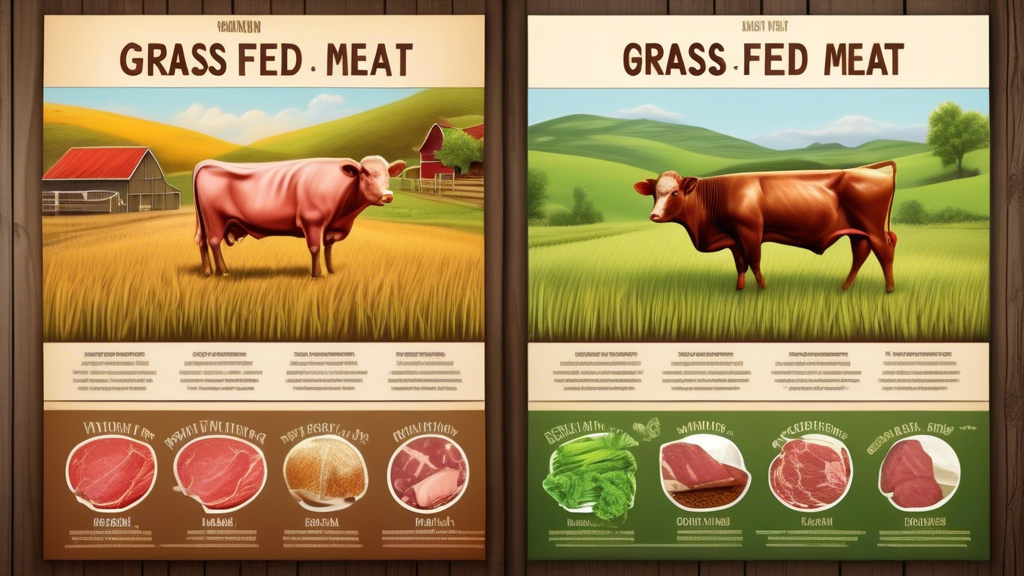Organic vs. Grass-Fed: Understanding Meat Label Differences

Organic vs. Grass-Fed: Understanding Meat Label Differences
When you're navigating the meat department of your grocery store, you might notice various labels like 'organic' and 'grass-fed' on meat packages. These terms may seem similar, but they represent very different standards and practices in livestock management. Understanding these differences can help you make more informed choices about the meat you purchase, based on your dietary preferences, ethical concerns, and environmental considerations.
What Does Organic Mean?
Organic meat certifies that the livestock was raised in a manner that complies with organic farming standards. These standards vary by country, but generally share some common principles:
- Feed: Animals must be fed 100% organic feed and forage. This feed cannot contain synthetic fertilizers, pesticides, or genetically modified organisms (GMOs).
- Healthcare: Organic farming emphasizes natural behaviors and health, reducing the need for antibiotics and hormones. Use of these is strictly regulated or banned.
- Access to Outdoors: Livestock should have access to the outdoors, which promotes natural behaviors and well-being.
Organic certification also covers the environmental footprint of farming practices, like waste management and the conservation of biodiversity and resources.
What Does Grass-Fed Mean?
'Grass-fed' refers to the diet of the livestock and has become a popular label for its perceived health benefits. Here's what typically qualifies as grass-fed meat:
- Diet: Animals graze on grass and other forage for the majority, if not all, of their lives.
- No Grain: Unlike conventional methods which often supplement with grain, grass-fed animals should not have grain in their diet.
- Continuous Access: Animals are generally allowed continuous access to pasture during the growing season.
It is important to note that 'grass-fed' does not necessarily mean the animal was raised in an organic system unless it also carries an organic certification.
Comparative Benefits and Considerations
Health Benefits
Many consumers choose organic or grass-fed meat for its health benefits. Grass-fed meat is often leaner and has higher levels of omega-3 fatty acids and vitamins like E. Organic meat, while similar in fat content to non-organic varieties, is free from synthetic hormones and antibiotics.
Environmental Impact
Organic and grass-fed farming practices can also have different environmental impacts. Grass-fed systems are praised for promoting soil health and reducing erosion through pasture rotation. Organic systems emphasize reducing chemicals and fostering biodiversity, which can lead to enhanced soil and water quality.
Ethical Considerations
For some consumers, the ethical treatment of animals is a significant factor. Organic and grass-fed labels tend to indicate better living conditions and more natural lifestyles for livestock, compared to conventional meat production systems.
Choosing What's Best for You
Deciding between grass-fed and organic meats often comes down to personal preference and values:
- Flavor: Some people prefer the taste of grass-fed meat, which can have a more robust flavor, whereas others may not notice a significant difference.
- Cost: Both organic and grass-fed meats generally come at a premium price. Consider your budget and how important these features are to you in the context of overall dietary habits.
- Ethics: Consider how strongly you feel about animal welfare, the use of antibiotics and hormones, and the environmental impact of the meat you consume.
By understanding the specifics behind these labels, you can choose meat products that align best with your health goals, ethical values, and environmental concerns.
Here's a thought to consider
In today's complex market, being a well-informed consumer allows you to direct your eating habits towards a healthier and more sustainable practice. Whether it's choosing grass-fed for its nutritional benefits and flavor or opting for organic to avoid chemicals and promote animal welfare, your choices have power. By understanding these labels, you wield that power more effectively.
Looking for updates? Sign up to our newsletter for weekly snippets.


